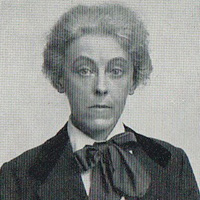Charlotte Mary Mew - Biography and Works
Charlotte Mary Mew was born as the daughter of Frederick Mew and Anna Kendall in Bloomsbury, London. Her father was a famous architect who designed Hampstead Town Hall. Her family gave her a nick name Lotti. When she went to Gower Street School, she was crazy for her headmistress Lucy Harrison.

Charlotte M. Mew (1869-1928)
In 1898 when her father died, the family faced a great loss and bad fortune: her three brothers died, later her one brother and a sister were sent to mental hospital due to mental illness. So, in her family just she, one sister and mother were left. Because of the hereditary mental illness, she and her sister decided not to marry. All the suffering and pain in her life later on shaped the major themes in her poetry: death, pain, mental illness, loneliness, disillusionment.
Mew is particularly known for her excellent poetry, but she started her career in writing with the short story ‘Passed’ that she published in The Yellow Book in 1894. She published many short stories, but they could not bring her the desired name and fame until she published her first poem ‘The Farmer’s Bride’ which she published in the Nation in 1912. Because of the publication of this poem, she started getting attention and her fame rise very soon. Her some of the famous poems are: 'Madeleine in Church' dealing the theme of faith and God, ‘In Nunhead Cemetery’ which have modern form and atmosphere, ‘Ken’ and ‘On the Asylum Road’ seriously deals with the theme of mental disillusionment.
Her outfit and appearance as a boy, her attraction to her headmistress in her school days and her style of writing in the dramatic monologue, especially as a male voice makes some of the critics suspect her to be a lesbian, but could not access adequate proof. Her many poems and stories have the pain of hidden feelings of lesbian.
Though she was recognized as the best poet of her time, she could not earn her living easily. Her first poetry collection The Farmer’s Bride Published in 1916 took a long time to get the market, though it gave her praises from the great literary figures like Siegfried Sassoon, Sara Teasdale, Ezra Pound, Thomas Hardy, and Virginia Woolf. Because of the severe financial difficulties, her sister Anne fell sick and later on diagnosed with the cancer. Anne died the next year and left Charlotte all alone. Because of the loneliness and despair, she became the victim of frustration. She went to a nursing home, but unfortunately she committed suicide in 1928.
